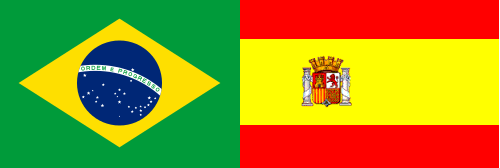How similar are Portuguese and Spanish? Posted by carol on Feb 15, 2017 in Brazilian Profile, Culture, Grammar, Learning, Spelling, Vocabulary
Português e Espanhol são idiomas muito parecidos?
Olá! ¡Hola! Hello!

If you already speak or study Spanish, you have probably noticed by now that it can sometimes be very similar to Portuguese (and vice versa!). People like to joke that Portuguese kind of sounds like drunken Spanish or the other way around (although there is something we Brazilians call portunhol, a combination of Portuguese and Spanish we often use when we interact with natives or speak Spanish if we don’t know it very well).
Broadly speaking, Portuguese and Spanish can be considered cognate languages, meaning they descend from a common language and share the same roots. This means that they also shares many correspondences with French and Italian because these are Romance languages, that is, they come from Latin.
In fact, these languages have many related words, comparable spelling and grammar structures. Of course, there is also a number of false cognates. So they are connected, but also diverge in many ways. The biggest distinction would be pronunciation, which varies greatly even though some words may look almost identical.
Today’s post will guide you through a quick look at these two language, showing some of its main differences.
Here they are. Look closely and compare:
- Some letters in Portuguese do not exist in Spanish, such as: ã – õ – ô – ê – ç, but Spanish has the consonant ñ
- Remember also that the consonant v often sounds like a b in Spanish, but in Portuguese it always sounds like a regular v.
- ón x ão
Nouns that end in ão in Portuguese generally appear as ón in Spanish. For example:
- Preste atenção ao dirigir um caminhão (port.) – Prestar atención mientras se conduce un camión (spa.) (Pay attention while driving a truck)
- inho/ inha x ito/ ita
This structure is called the diminutive, used as a way to indicate that something is small. In english, it can be expressed by the word “little”. So:
- Minha família vive em uma casinha (port.) – Mi familia vive en una casita (spa.) (My family lives in a little house)
- agem x aje
The main difference between these two common word endings is that, in Portuguese, they usually refer to the feminine gender, while in Spanish they are masculine
- Esqueci de levar maquiagem para a viagem (port.) – Me olvidé de traer maquillaje para el viaje (spa.) (I forgot to bring makeup to the trip)
- nh x ñ
They both sound the same, and are meant to express a nasal sound. But theyr are written differently in each language.
- Meu sonho é conhecer a Espanha (port.) – Mi sueño es conocer España (spa.) (My dream is to know Spain)
- e/o x ie/ue
This combination of vowels in Spanish, called diphtongs, becomes a single vowel in Portuguese. Take a look:
- Que bom te ver de novo (port.) – ¡Qué gusto verte de nuevo! (spa.) (Nice to see you again!)
- Você vem sempre aqui? (port.) – ¿Usted viene siempre aqui? (spa.) (Do you come here often?)
False cognates:
roxo – purple / rojo – red
cadeira – chair / cadera – hip
serviço – service / servicio – toilet
firma – office / firma – signature
We’ll talk more about the Portuguese languague later on. Stay tuned!
Tenham uma boa semana! ¡Tengan una buena semana! Have a great week!
Adeus! Adiós! Bye!

Build vocabulary, practice pronunciation, and more with Transparent Language Online. Available anytime, anywhere, on any device.




Comments:
Séamas:
As I am a long-time learner of both languages this article is of interest to me. However it is not just Brazilians who talk about ‘portunhol’. The Portuguese and the Spanish are also aware of and have recourse to this inter-language; I’m guilty of using it myself often enough!